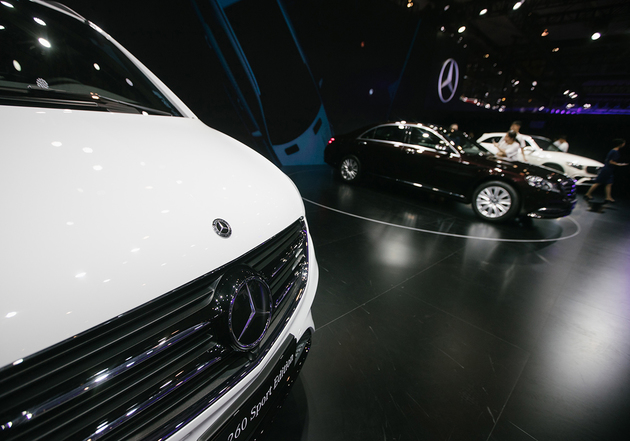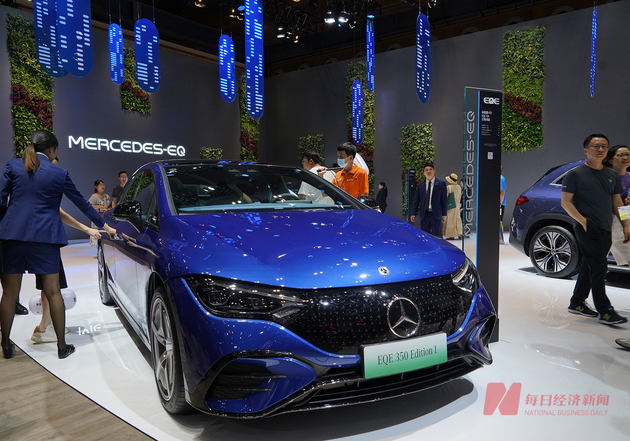
Photo/Zhang Jian (NBD)
Mercedes-Benz is channelling billions of euros into its electric products, as stated by Ola Källenius, Chairman of the Board of Management at Mercedes-Benz Group AG, in a recent interview with the NBD. The company’s goal and determination to transition to electric mobility remain unchanged.
At the recent annual shareholders’ meeting, Källenius assured investors that Mercedes-Benz would continue to improve its fuel models. He also adjusted EV sales target (50% by 2025), a move misinterpreted as a sign of slowing down the electrification process.
Källenius emphasized that, due to factors like infrastructure, charging facilities, and subsidies, fuel-powered vehicles might still have relevance in some global markets by 2030. Mercedes-Benz consistently tailors its strategy to market conditions. After 2030, the company will further advance its electrification efforts, offering customers both all-electric models and fuel models.
“In summary, our commitment to electrification by 2030 has never wavered. When certain market conditions do not allow, we respect customer's choice. So whether it’s fuel or electric, it’s very Mercedes-Benz,” Källenius stated.
Hubertus Troska, Board Member of Mercedes-Benz Group AG responsible for Greater China, conveyed that while customers may need time to embrace luxury electric vehicles, the company remains flexible in its business tactics. He assured that Mercedes-Benz would introduce more electric models in the high-end luxury segment in the future.
Indeed, Mercedes-Benz’s commitment to electrification is evident, especially in the Chinese market, where it has launched a lineup of nine electric models. This year, Mercedes-Benz will bring 15 new products to the Chinese market, including the all-new electric G-Class off-road vehicle, the brand-new Maybach EQS electric SUV, and the next-generation EQA and EQB electric SUVs. Additionally, new models built on the MMA platform will start production in China by 2025.

Photo/Kong Zesi (NBD)
At the 2023 Munich Motor Show, Mercedes-Benz unveiled a new CLA-class concept car equipped with the next generation of electric drive systems. Källenius revealed that the company is investing billions of dollars to maintain its leading position in electric vehicles and digital experiences.
“Our electric models will continuously be upgraded this year, featuring longer ranges and enhanced intelligence. Our pace of technological development is accelerating. We no longer wait for new technology to mature before building the next model; instead, we constantly apply new technology to our existing models,” Källenius explained, adding that Mercedes-Benz will increase its investment in Beijing Benz to produce new electric models in China.
Moreover, Källenius highlighted the company’s growing R&D investment in China, with large-scale R&D centers established in Beijing and Shanghai. This local R&D not only serves the Chinese market better but also uses Chinese innovation to contribute to global advancements.
Troska informed that as Mercedes-Benz’s largest single market globally, China’s rapid evolution in autonomous driving, automotive software, intelligent connectivity, and voice technology necessitates swift innovation from Mercedes-Benz. The company’s R&D footprint in China is the most comprehensive outside Germany, with broader responsibilities than in other markets.
“Engineers at Mercedes-Benz’s R&D in China can make autonomous decisions in many areas without needing to consult with headquarters,” Troska said. “The speed, empowerment, talent, and confidence of China have made Mercedes-Benz’s local R&D one of the most complete globally, empowering its worldwide development.”
Amid increasing global economic uncertainties, Mercedes-Benz holds a positive view on the long-term development of the Chinese economy and economic and trade cooperation between China, Europe, and Germany.
According to the Ministry of Commerce, in 2023, China and Europe were good trade partners, with bilateral trade reaching 5.5 trillion yuan. German companies, represented by Mercedes-Benz, are continuously increasing their investments in China. A report by the German Economic Research Institute, based on data from the Bundesbank, indicated that Germany’s direct investment in China reached a record 11.9 billion euros in 2023, up 4.3% from 2022. Furthermore, Germany’s investment in China accounted for 10.3% of its total foreign investment, the highest level since 2014.
“The economic ties between China and Europe are very close, with substantial trade volumes. I believe these ties cannot be weakened, nor does anyone wish to weaken them. Win-win cooperation is the only common choice,” Källenius stated. He believes that open global markets, increased competition, and more trade are engines of economic growth. Mercedes-Benz is confident in the prospects of investing in China and benefiting from the development opportunities in the Chinese market.


 川公网安备 51019002001991号
川公网安备 51019002001991号





